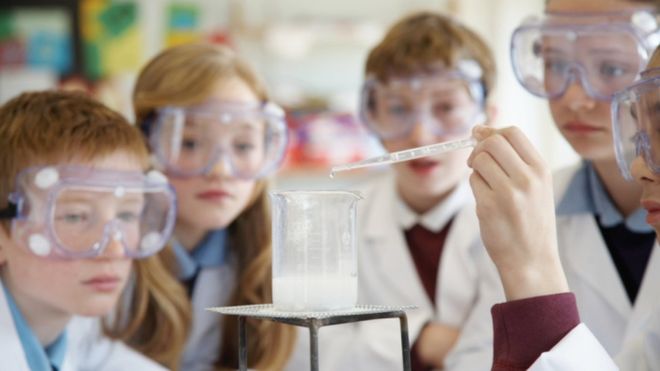Reino Unido/Diciembre de 2016/Fuente: BBC News
RESUMEN: Los mejores científicos temen que los planes para más escuelas de gramática en Inglaterra no aumenten las calificaciones de los alumnos desfavorecidos. En general, los alumnos más pobres hacen peores en ciencias y matemáticas en áreas con escuelas selectivas, sugiere la investigación de la Royal Society, la academia científica independiente del Reino Unido. Es probable que las nuevas gramáticas ayuden a «sólo una pequeña proporción» de los alumnos más pobres, dice. Los Ministros sostienen que sus propuestas mejorarán la movilidad social. Una consulta gubernamental sobre planes para una educación más selectiva cerró a principios de este mes. «La movilidad social es un tema complejo», dijo el profesor Tom McLeish, presidente del Comité de Educación de la Royal Society. «Apoyamos el compromiso del gobierno de asegurar que todos los estudiantes cumplan con su potencial, independientemente de sus antecedentes.
Top scientists fear plans for more grammar schools in England will not boost disadvantaged pupils’ grades.
Overall, the poorest pupils do worse in science and maths subjects in areas with selective schools, suggests research for the Royal Society, the UK’s independent scientific academy.
New grammars are likely to help «only a small proportion» of the poorest pupils, it says.
Ministers maintain that their proposals will improve social mobility.
A government consultation on plans for more selective education closed earlier this month.
«Social mobility is a complex issue,» said Prof Tom McLeish, chairman of the Royal Society’s Education Committee.
«We support the government’s commitment to ensuring all students fulfil their potential, regardless of their background.
«However, we are concerned that the approach to selective education outlined in the green paper may only support the small number of high ability disadvantaged pupils who do attend selective schools, at the cost of disadvantaged pupils who do not.»
Researchers from the Education Policy Institute, commissioned by the Royal Society, looked at the impact of selective education on the attainment of the most disadvantaged young people – those on free school meals – in STEM (science, technology, engineering and maths) subjects.
The researchers found free school meals pupils performed less well in GCSE maths in areas where there were selective schools.
In non-selective areas in 2015, 48.1% of free school meals pupils got a C or more, compared with 72.3% of pupils not eligible for the meals.
But in selective areas the attainment gap was wider, with only 43.9% of free school meals pupils getting at least a C, compared with 74.8% of pupils not receiving the meals.
The researchers found that free school meals pupils in selective schools performed very well, with 98% getting at least a C, compared with 99.2% of non-free school meals pupils.
However, free school meals pupils make up only 3% of selective schools so their achievements are not enough to make any difference to «an overall negative impact on the attainment of all free school meals pupils in GCSE mathematics in selective areas», say the researchers.
Specialist teachers
They also found that fewer free school meals pupils in selective areas took double or triple sciences at GCSE.
«We have found no evidence to suggest that overall educational standards for free school meals pupils in STEM subjects in England would be improved by an increase in the number of places in selective schools,» the Royal Society concludes.
Dr McLeish added that the best way to help every pupil achieve their potential is to make sure that they are taught by «well-trained, motivated and supported, specialist science teachers».
Support is essential, he said, to help teachers «draw out the natural curiosity and creativity that grows from a framework of knowledge in science».
In particular, the Royal Society proposes partnerships between universities, schools and businesses which could involve university staff teaching part-time and even carrying out some of their research in schools.
The Department for Education said its proposals were «about creating more choice, with more good school places in more parts of the country».
It said grammar schools have a «track record of closing the attainment gap» and the department was also raising standards for maths and science for all pupils.
A spokesman added: «We have introduced rigorous new qualifications and in science we are investing £12.1 million over the next three years to improve the quality of teaching in schools.»
Fuente: http://www.bbc.com/news/education-38343307








 Users Today : 25
Users Today : 25 Total Users : 35460328
Total Users : 35460328 Views Today : 30
Views Today : 30 Total views : 3419058
Total views : 3419058